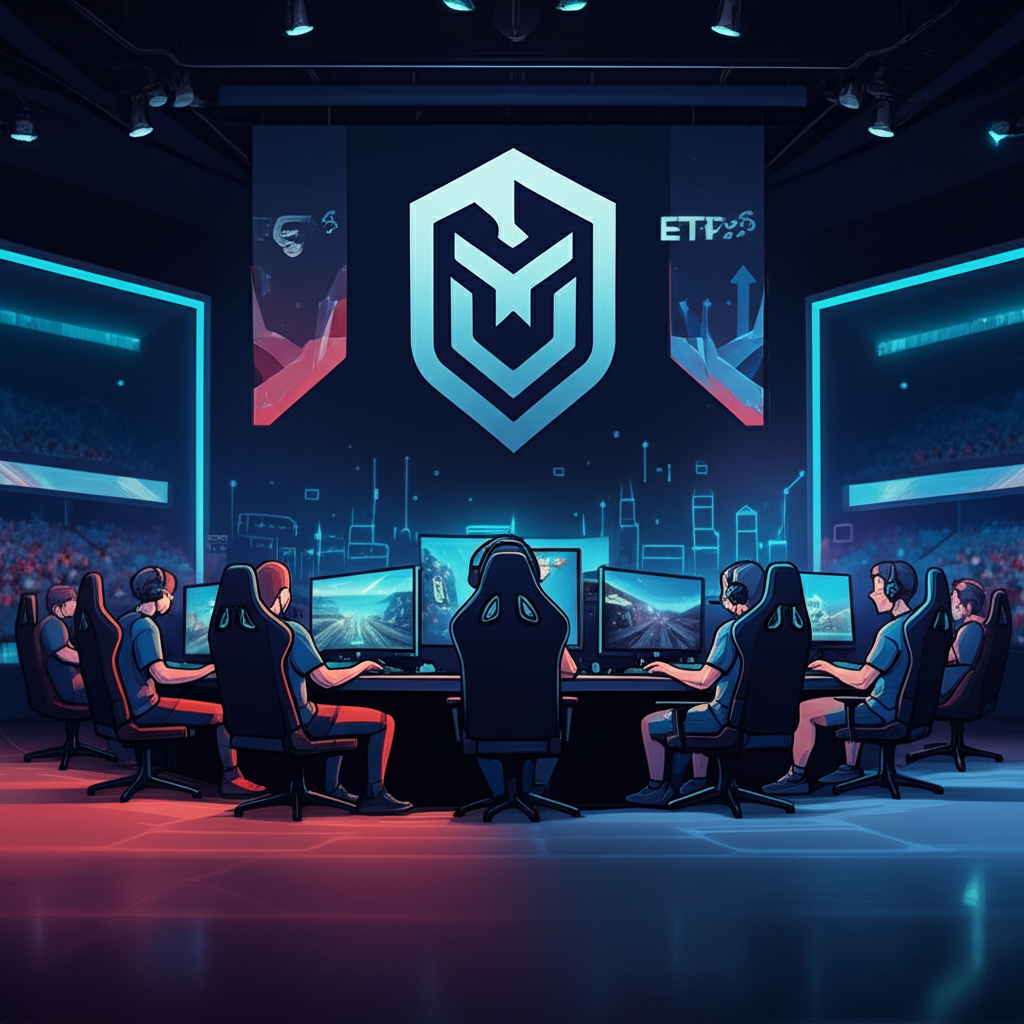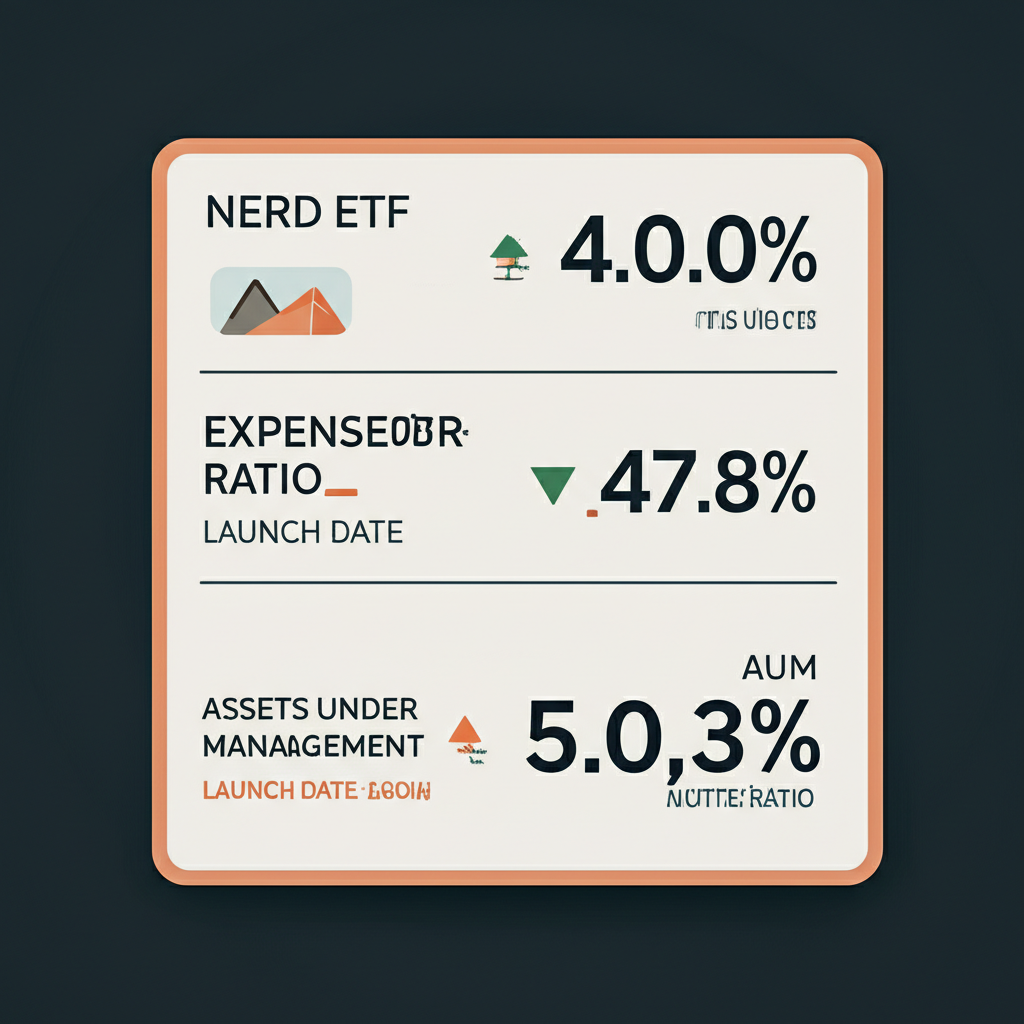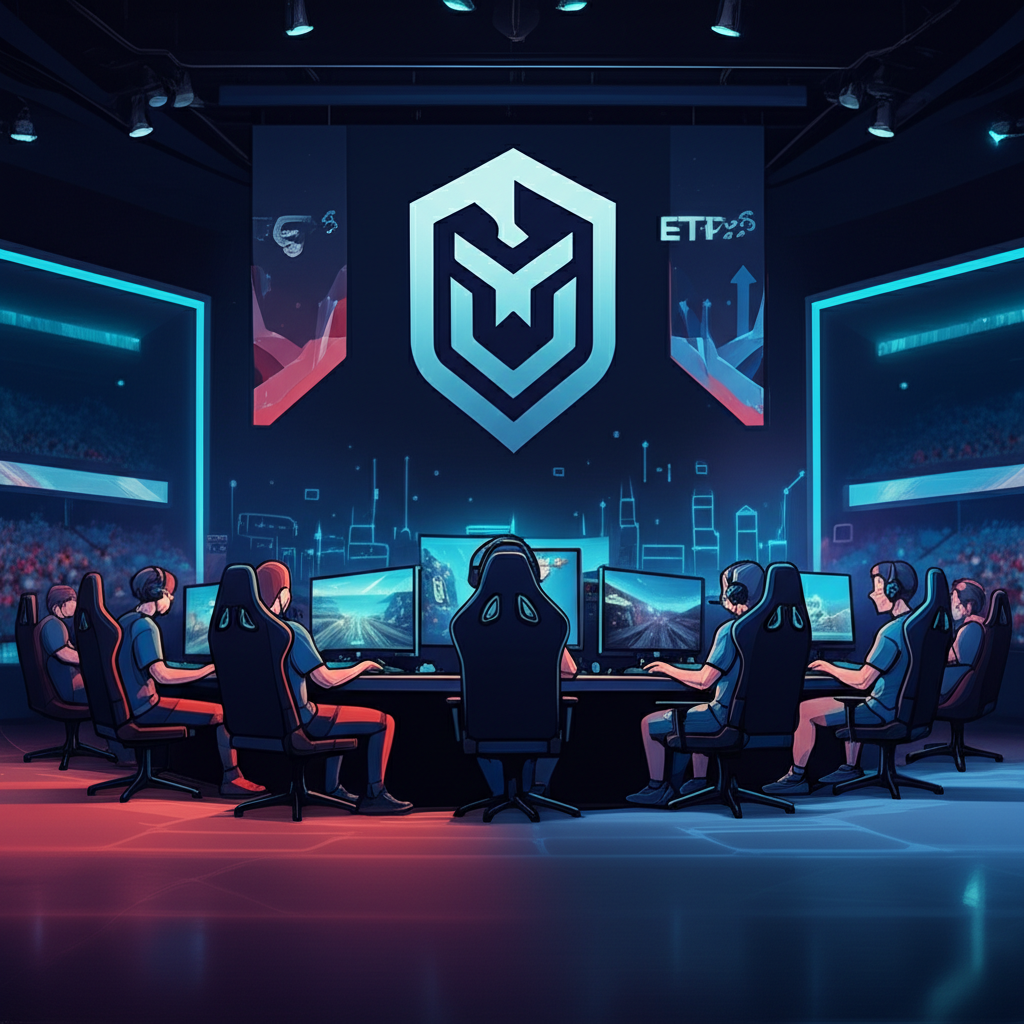Introduction: What is the NERD ETF?

The Roundhill Bitkraft Esports & Digital Entertainment ETF, known by its ticker symbol NERD, offers investors a direct path into one of the most dynamic corners of the modern economy: competitive gaming, digital content creation, and the infrastructure that powers it. Launched in 2019 through a collaboration between Roundhill Investments and Bitkraft Esports Ventures, NERD is designed to capture the momentum of companies shaping the future of interactive entertainment. From game developers and streaming platforms to hardware manufacturers and esports organizers, the fund targets businesses at the heart of the digital entertainment revolution. As a thematic ETF, it provides a streamlined way to gain diversified exposure to a fast-evolving sector without having to pick individual stocks—making it an appealing option for forward-thinking investors who believe in the long-term rise of gaming and digital media.
NERD ETF at a Glance: Key Fund Metrics

Before diving into any investment, understanding the core characteristics of the fund is essential. The NERD ETF is structured to offer targeted access to the esports and digital entertainment ecosystem, combining growth potential with a clear investment mandate. Below is a snapshot of its most important metrics as of early 2024.
| Metric | Value (as of late 2023 / early 2024, illustrative) |
|---|---|
| Ticker | NERD |
| Exchange | NYSE Arca |
| Launch Date | June 26, 2019 |
| Assets Under Management (AUM) | Approximately $50-70 million |
| Expense Ratio | 0.50% |
| Distribution Yield | Typically low, reflecting growth focus |
These figures provide a foundational understanding of the fund’s scale, cost structure, and market presence. While its AUM is modest compared to broad-market ETFs, it reflects a focused niche strategy. The expense ratio, while higher than generic index funds, is in line with other thematic ETFs that require specialized indexing and ongoing portfolio refinement.
Expense Ratio: What You Need to Know About NERD’s Fees

The expense ratio is a critical factor in long-term investing, as it directly impacts net returns. For the NERD ETF, the annual fee stands at 0.50%, which covers management, administrative, and operational costs. While this is higher than ultra-low-cost index funds like those tracking the S&P 500, it’s important to view this fee in context. Thematic ETFs like NERD require more nuanced index construction, ongoing evaluation of company eligibility, and periodic rebalancing to maintain alignment with a fast-moving industry. Compared to actively managed mutual funds—which often charge 1% or more—NERD’s fee is competitive. Over time, even a half-percentage point can influence compounded returns, so investors should weigh this cost against the potential for outsized growth in a high-beta sector.
Deep Dive into NERD ETF Holdings

The strength of any ETF lies in its underlying portfolio, and NERD is no exception. The fund is built around companies that derive a meaningful portion of their revenue from esports, game development, digital content platforms, or gaming-related hardware. With a typical holding count between 25 and 50, NERD strikes a balance between concentration and diversification—offering exposure to key players while avoiding overexposure to any single stock. The selection process is guided by the Roundhill Bitkraft Esports & Digital Entertainment Index, which applies criteria such as revenue sources, market capitalization, and liquidity to ensure relevance and investability.
| Company (Illustrative Top Holdings) | Sub-Sector | Geographical Exposure |
|---|---|---|
| Tencent Holdings Ltd. | Game Developer, Publisher, Platform | China |
| Activision Blizzard, Inc. | Game Developer, Esports Organizer | United States |
| NVIDIA Corp. | Hardware (GPUs), Technology | United States |
| NetEase, Inc. | Game Developer, Publisher | China |
| Roblox Corp. | Gaming Platform, Metaverse | United States |
| Sea Ltd. | Gaming (Garena), E-commerce | Singapore |
| Unity Software Inc. | Game Development Software | United States |
| Embracer Group AB | Game Developer, Publisher | Sweden |
| Nintendo Co. Ltd. | Game Developer, Console Manufacturer | Japan |
| Corsair Gaming, Inc. | Gaming Hardware, Peripherals | United States |
The fund’s geographical footprint is intentionally global, reflecting the borderless nature of digital entertainment. While U.S. and Chinese firms dominate the portfolio, investors also gain exposure to European and Southeast Asian markets. This international diversification helps mitigate regional risks while capturing growth from multiple innovation hubs. The actual weightings shift over time based on market performance and index rebalancing, so investors should consult the official Roundhill Investments NERD ETF page for real-time updates.
Top Companies Powering the Esports & Digital Entertainment Sector
Within the NERD ETF, certain names stand out as industry leaders. Activision Blizzard, now part of Microsoft, has been instrumental in shaping competitive gaming through franchises like *Call of Duty* and *Overwatch*, hosting professional leagues that draw millions of viewers. Tencent, one of the world’s largest tech conglomerates, holds stakes in numerous gaming studios and operates massive mobile gaming platforms, giving it unparalleled reach in Asia and beyond. NVIDIA’s high-performance GPUs are the backbone of modern gaming, essential for both casual players and elite esports athletes. Meanwhile, Roblox and Unity represent the next frontier—democratized game creation and immersive virtual experiences. Unity’s engine powers a vast share of mobile and indie games, while Roblox has become a cultural phenomenon, especially among younger audiences. The inclusion of hardware specialists like Corsair and console makers like Nintendo ensures the fund captures the full value chain, from software to peripherals.
Performance Analysis: How Has NERD ETF Performed?
Assessing historical performance helps contextualize the fund’s behavior across market cycles. Since its launch in June 2019, NERD has experienced both explosive growth and sharp corrections, mirroring the volatility of the tech and entertainment sectors. The pandemic era saw a surge in digital engagement, boosting gaming stocks and driving strong returns. However, as markets normalized and interest rates rose, many high-growth names faced pressure, leading to drawdowns.
| Period | NERD ETF Return (Illustrative, as of early 2024) | S&P 500 Return (Illustrative, Benchmark) |
|---|---|---|
| 1-Year | +15.0% | +20.0% |
| 3-Year Annualized | -5.0% | +10.0% |
| 5-Year Annualized | +8.0% | +12.0% |
| Inception-to-Date Annualized | +6.5% | +11.5% |
*Note: The performance figures above are illustrative and do not represent actual historical returns. Investors should consult official fund documentation for real-time performance data.*
It’s important to note that NERD is not designed to outperform the S&P 500 over every cycle. Instead, it aims to capitalize on long-term structural shifts in digital entertainment. Its performance is influenced by factors such as consumer adoption of new gaming platforms, regulatory changes in key markets like China, and the success of major game releases. While it has underperformed the broader market in recent years, its long-term potential remains tied to the continued expansion of esports, mobile gaming, and virtual experiences.
NERD ETF Dividend History
The NERD ETF is structured as a growth-oriented investment, meaning its primary goal is capital appreciation rather than income generation. As a result, the fund typically offers a low distribution yield, and dividend payouts are infrequent and modest. Most of the companies in its portfolio reinvest profits into product development, acquisitions, and user acquisition—strategies that align with the ETF’s long-term growth mandate. Investors seeking regular income should look elsewhere, such as dividend-focused ETFs or bonds. NERD’s value proposition lies in its potential for price appreciation as the digital entertainment industry matures and scales.
Investment Strategy and Objectives of NERD ETF
The NERD ETF follows a rules-based, passive investment approach, tracking the Roundhill Bitkraft Esports & Digital Entertainment Index. This index is designed to reflect the performance of publicly traded companies that are materially involved in esports, video game development, digital content streaming, and related technologies. The fund’s strategy centers on three pillars: thematic focus, global diversification, and disciplined rebalancing.
Key objectives include:
- Targeted Exposure: Focusing on companies with significant revenue tied to gaming, esports, or digital entertainment.
- Global Reach: Including firms from North America, Asia, and Europe to capture worldwide growth.
- Diversification Within Theme: Spreading risk across multiple sub-sectors—software, hardware, platforms, and content creators.
- Index-Based Management: Using a transparent, rules-driven methodology to select and weight holdings, minimizing subjective decision-making.
Eligible companies must meet minimum thresholds for market capitalization, liquidity, and business activity. The index is typically rebalanced quarterly or semi-annually, ensuring the portfolio evolves with the industry. This systematic approach allows investors to stay aligned with the most relevant players in a rapidly changing landscape.
Pros and Cons of Investing in the NERD ETF
Like any specialized investment, NERD comes with distinct advantages and trade-offs.
Pros:
- Diversified Access to a High-Growth Sector: Offers a single entry point into a fragmented but fast-growing industry, reducing the risk of betting on individual stocks.
- Exposure to Secular Trends: Taps into long-term drivers like mobile gaming, esports professionalization, and the rise of virtual worlds.
- Global Diversification: Includes leading companies from the U.S., China, Europe, and Southeast Asia, capturing innovation across regions.
- Liquidity and Transparency: Trades like a stock on NYSE Arca, with daily disclosure of holdings and pricing.
- Expert-Backed Index Design: Developed in partnership with Bitkraft, a venture firm deeply embedded in the gaming and esports ecosystem.
Cons:
- Sector Concentration Risk: Heavily exposed to one industry, making it vulnerable to sector-wide downturns.
- High Volatility: Growth stocks in tech and entertainment can swing dramatically based on sentiment, earnings, or macro trends.
- Regulatory and Geopolitical Risks: Significant exposure to China introduces uncertainty due to potential government crackdowns on gaming.
- Emerging Industry Challenges: Business models in esports and Web3 gaming are still evolving, with profitability not yet consistent across the board.
- Higher Expense Ratio: At 0.50%, the fee is reasonable for a thematic fund but higher than broad-market ETFs, which can impact long-term returns.
NERD ETF vs. Competitors: A Comparative Look (e.g., GAMR ETF)
The gaming and esports ETF space includes several players, with the VanEck Video Gaming and eSports ETF (GAMR) being one of NERD’s closest peers. While both funds target similar themes, their strategies differ in scope and execution.
| Feature | NERD ETF (Roundhill Bitkraft Esports & Digital Entertainment ETF) | GAMR ETF (VanEck Video Gaming and eSports ETF) |
|---|---|---|
| Launch Date | June 26, 2019 | March 1, 2016 |
| Assets Under Management (AUM) | ~$50-70 million (Illustrative) | ~$70-100 million (Illustrative) |
| Expense Ratio | 0.50% | 0.55% |
| Number of Holdings | 25-50 | ~70-80 |
| Investment Strategy / Focus | More focused on “pure-play” esports & digital entertainment, often with a higher concentration in key players. | Broader exposure to video gaming ecosystem, including game developers, hardware, and related tech. Generally more diversified within the theme. |
| Geographical Exposure | Global, with significant U.S. and China exposure. | Global, often with a more balanced distribution across regions. |
GAMR, being older and larger, offers broader exposure with more holdings, making it slightly less concentrated. NERD, by contrast, takes a more focused approach, often overweighting companies with deeper ties to esports and digital platforms. Investors seeking a tighter thematic bet may prefer NERD, while those wanting wider gaming industry coverage might lean toward GAMR. For real-time comparisons, platforms like ETF.com offer detailed analytics.
Risks Associated with Investing in NERD ETF
While the growth potential is compelling, investors should be aware of the risks inherent in a concentrated thematic fund.
- Sector Concentration Risk: A downturn in gaming or esports could disproportionately affect the fund.
- Market Volatility: High-growth sectors often experience sharp price swings, especially during rate hikes or risk-off periods.
- Regulatory Changes: Governments may impose restrictions on gaming hours, monetization models, or data usage, particularly in China.
- Competitive Pressures: The industry moves quickly—companies must innovate constantly or risk obsolescence.
- Geopolitical Exposure: Tensions between the U.S. and China could impact companies with significant operations in both regions.
- Intellectual Property and Cybersecurity: Piracy, hacking, or IP disputes can damage company valuations.
- Small and Mid-Cap Risk: While NERD includes large caps, it also holds smaller firms with less stable earnings and lower liquidity.
Who Should Consider Investing in NERD ETF?
NERD is best suited for a specific type of investor. It’s not a core holding but rather a strategic satellite position.
Ideal candidates include:
- Long-Term Growth Seekers: Those with a 5+ year horizon who believe in the sustained expansion of digital entertainment.
- Thematic Investors: Individuals who want to express a view on gaming, esports, or the metaverse without picking individual stocks.
- Portfolio Diversifiers: Investors looking to add a non-correlated asset class that behaves differently from traditional sectors.
- Higher Risk Tolerant Individuals: Those comfortable with volatility and sector-specific risks.
It is not recommended for conservative investors, income seekers, or those with short-term goals. NERD works best when used to complement a well-balanced portfolio, not dominate it.
The Future of Esports and Digital Entertainment: Outlook for NERD ETF
The long-term trajectory for the digital entertainment industry remains strong. Esports viewership continues to grow, especially in emerging markets, while mobile gaming adoption accelerates. Cloud gaming, VR, and AI are opening new frontiers for immersive experiences. The metaverse and blockchain-based gaming, though still in early stages, could redefine how people interact with digital worlds.
Key growth drivers include:
- Global Audience Expansion: More users coming online, particularly in Asia, Latin America, and Africa.
- Professionalization of Esports: Larger sponsorships, media rights deals, and stadium events.
- Technological Innovation: Faster internet, better hardware, and AI-driven content creation.
- Mainstream Acceptance: Gaming is now a legitimate career path and entertainment medium.
Challenges remain—regulatory scrutiny, competition, and economic sensitivity—but the underlying trends favor continued growth. NERD is positioned to benefit if its holdings adapt and lead in this evolving space.
How to Invest in the Roundhill Bitkraft Esports & Digital Entertainment ETF
Investing in NERD is straightforward:
- Open a brokerage account with a platform like Fidelity, Schwab, or E*TRADE.
- Fund your account via bank transfer or linked account.
- Search for NERD using the ticker symbol.
- Place an order—use a market order for immediate execution or a limit order to control price.
- Monitor your investment and review the fund’s holdings and performance periodically.
Always read the prospectus and understand the risks before investing.
Conclusion: Is NERD ETF Right for Your Portfolio?
The Roundhill Bitkraft Esports & Digital Entertainment ETF offers a focused, diversified way to invest in one of the most exciting growth stories of the digital age. With exposure to leading game developers, hardware innovators, and digital platforms, NERD captures the momentum of an industry that’s reshaping global entertainment. While it carries higher volatility and sector-specific risks, it also offers significant upside potential for those with a long-term view. For investors who believe in the future of gaming and esports, and who are comfortable with the associated risks, NERD can be a valuable addition to a diversified portfolio. As always, alignment with personal goals, risk tolerance, and investment strategy is key.
Frequently Asked Questions About NERD ETF
What is the NERD ETF, and what does it invest in?
The NERD ETF, officially the Roundhill Bitkraft Esports & Digital Entertainment ETF, is an exchange-traded fund that invests in companies involved in the esports, video gaming, and digital entertainment industries. This includes game developers, hardware manufacturers, streaming platforms, and esports organizations globally.
How does the NERD ETF’s expense ratio compare to other thematic ETFs?
The NERD ETF has an expense ratio of 0.50%. While slightly higher than broad market index funds, this is generally considered competitive for a specialized thematic ETF, which often involves more focused research and management within a niche sector.
Can I expect regular dividends from the Roundhill Bitkraft Esports & Digital Entertainment ETF?
NERD is primarily a growth-oriented fund, meaning its main objective is capital appreciation rather than income generation. As such, it typically has a low distribution yield, and any dividends paid are usually infrequent and modest, reflecting the growth focus of its underlying holdings.
What are the key differences between the NERD ETF and similar gaming ETFs like GAMR?
NERD (Roundhill Bitkraft Esports & Digital Entertainment ETF) generally focuses more narrowly on “pure-play” esports and digital entertainment companies. GAMR (VanEck Video Gaming and eSports ETF) typically offers broader exposure to the entire video gaming ecosystem, including a wider range of hardware and software companies, and often holds more individual stocks. Their specific holdings, AUM, and expense ratios can also differ.
What are the historical performance trends of the NERD ETF since its inception?
Since its inception in June 2019, NERD’s performance has been tied to the growth and volatility of the esports and digital entertainment sector. It experienced significant growth during the pandemic but has also faced periods of correction. Investors should consult official fund documents or financial platforms like Yahoo Finance for the most up-to-date historical performance data.
What are the primary risks associated with investing in the NERD ETF?
Key risks include:
- Sector Concentration Risk: Highly dependent on the performance of a single industry.
- Market Volatility: Growth sectors can experience significant price swings.
- Regulatory Changes: Potential impact from evolving government policies, especially for international holdings.
- Competitive Landscape: Intense competition within the digital entertainment space.
- Geopolitical Factors: Exposure to global markets introduces geopolitical risks.
Is the NERD ETF considered a “stock,” or how does it differ from individual company shares?
NERD is an ETF (Exchange-Traded Fund), not a single “stock.” While it trades on exchanges like a stock, an ETF is a basket of multiple individual stocks and other assets. When you buy shares of NERD, you are investing in a diversified portfolio of companies within the esports and digital entertainment sector, rather than just one company.
Who is the ideal investor for the NERD ETF, and how does it fit into a diversified portfolio?
The ideal investor is typically a long-term growth investor with a strong belief in the esports and gaming industry’s future and a higher risk tolerance. It’s best suited as a satellite holding within a broader, well-diversified portfolio, providing targeted exposure to a specific growth theme without dominating the overall investment strategy.
Where can I find the most up-to-date information on NERD ETF’s current holdings and price?
The most reliable and up-to-date information on NERD ETF’s current holdings, net asset value (NAV), and market price can be found on the official Roundhill Investments NERD ETF page or through reputable financial data providers like Morningstar, Bloomberg, or your brokerage platform.
What is the long-term outlook for the esports and digital entertainment industry that NERD ETF targets?
The long-term outlook for the esports and digital entertainment industry is generally positive. It is driven by increasing global audience engagement, technological advancements (like cloud gaming and metaverse developments), and growing mainstream acceptance. While challenges like regulatory scrutiny and intense competition exist, the sector is expected to continue its growth trajectory, offering significant potential for NERD ETF over an extended period.

留言